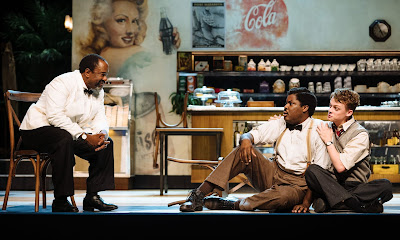Soulpepper delivers an outstanding production of A Streetcar Named Desire
that is unfortunately marred by the annoying addition of a band and hokey set
design. It has a superb cast that brings out the pathos, delicacy, brutality
and fragility inherent in the lives of the characters with unfailing sharpness
and sensitivity.
You cannot have a successful production of A Streetcar without a
convincing Blanche Dubois and in Amy Rutherford Soulpepper has found one of the
best. Blanch is a complex character. She is or would like to be a beautiful,
cultured and sophisticated Southern belle, raised in a world of wealth and
gentility on a large plantation.
Amy Rutherford and Mac Fyfe. Photo: Dahlia Katz
Rutherford as Blanch still retains some of her beauty but she is past
her prime and her attractiveness is best seen in the dim light. She is broke
and her furs and clothing that she so cherishes are pathetic imitations which
confer no status but bespeak her pretentiousness in her dire straits. She is
forced to put on airs and lie about herself. More sinisterly, she is a sexual
predator with a weakness for young boys. All of this has resulted in total
degradation to the extent that she has had to
sell her body to survive. Rutherford has had to project all of these characteristics
and she does so with conviction and total
success. A marvelous performance.
Williams has provided Blanche’s opposite in her sister Stella played
splendidly by Leah Doz. At first blush Stella appears like an abused,
downtrodden wife living in a slum in New Orleans. We learn however that she is
a woman of considerable strength who is deliciously in love with her husband
Stanley and has found contentment in her situation. She sees through her sister
and tries to support her emotionally and financially. Doz gives us a
sympathetic, strong, attractive and decent Stella. Superb performance.
The man between the two sisters is Stella’s husband Stanly played by Mac
Fyfe. With his card-playing friends, he is loud and obnoxious. Blanche has a
whole array of adjectives to describe him which amount to him being an uncouth,
crude, disgusting man. Indeed he is a Neanderthal. His redeeming feature is
that he loves Stella and she loves him and their sexual attraction is a major
factor in their relationship. This is the person that Fyfe needs to convey and
he does with passion and conviction.
Amy Rutherford, Sebastian Marziali, Lindsay Owen-Pierre,
Leah Doz, and Mac Fyfe. Photo: Dahlia Katz.
The other major character is Mitch played by Gregory Prest. He is the
soul of decency, still a bachelor and devoted to the care of his mother. Blanch
sees her opportunity for a harbour in him and he sees a decent woman for
himself. He finds out that he has been grossly misled by Blanche and runs away.
A highly sympathetic portrayal by Prest.
I have nothing but praise for the rest of the cast but they are largely supporting characters for the main
conflict among the four main people in the play.
The set by Lorenzo Savoini begins with aluminum siding covering the
three sides of the stage. I am not sure what it is supposed to convey but it
could easily be a warehouse. Stanly and Stella’s apartment with its small
living room area where the men play cards, the curtain that separates it from
the bedroom with its prominent bed is satisfactory.
Director Weyni Mengesha does a superlative job in directing the
production but I am not sure about the addition of a band on stage. There is
room for music in A Streetcar and the script provides for it but when a panel of
the stage is removed and a band appears we have
moved far from Williams’ play. No doubt there was some thinking behind the
introduction of a band on stage but the rationale escaped me.
Forget the band and go see an extraordinary production of a great play.
_________
A Streetcar Named Desire by Tennessee Williams continues until October
27, 2019 at the Young Centre for the Performing Arts, 55 Tank House Lane,
Toronto, Ontario, M5A 3C4. www.soulpepper.ca.
James Karas is the Senior Editor - Culture of The Greek Press.













